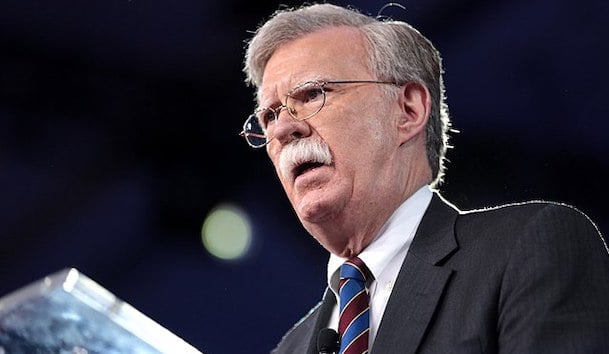Only by firing John Bolton, I wrote in this blog three months ago, President Donald Trump may demonstrate “that he is still ready, even belatedly, to stop the ongoing kidnapping of his foreign policy by the enemy within the gates.” He has done so, thus reducing the danger of America’s entanglement in yet another Middle Eastern war and improving his own chances of reelection next year.
“I informed John Bolton last night that his services are no longer needed at the White House,” Trump tweeted on Tuesday morning. “I disagreed strongly with many of his suggestions, as did others in the Administration, and therefore I asked John for his resignation, which was given to me this morning. I thank John very much for his service.”
Trump’s terse tone indicates that “strong disagreements” were not limited to policy deliberations. It was also a clash of egos, with the National Security Adviser repeatedly attempting to impose his preferred courses of action on the President–invariably bellicose ones–rather than offering opinion on the pros and cons of different policy options. First and foremost it was a conflict between two fundamentally opposed grand-strategic visions, between Trump’s “America first” and Bolton’s “America everywhere.”
Within minutes Bolton retorted, as could be expected from a wounded prima donna, “I offered to resign last night and President Trump said, ‘Let’s talk about it tomorrow.’” Either way, Bolton’s departure had been on the cards at least since June 21, when Trump announced that he had authorized but then called off air strikes against Iranian targets in retaliation for Iran’s downing of an American drone over the Gulf of Yemen. Bolton had been an enthusiastic supporter of that operation in particular, and–for many years, relentlessly–of the war against Iran in general.
The following week (June 30), Bolton was notably absent from Trump’s DMZ meeting with Kim Jong Un after the2019 G20 Osaka summit. A month earlier the President coldly undercut Bolton over missile tests by Pyongyang: “North Korea fired off some small weapons, which disturbed some of my people, and others, but not me,” he tweeted. “My people” allusion was clear: Bolton had told reporters just hours earlier that those tests violated UN Security Council resolutions.
Most recently, on September 8 Trump abruptly cancelled separate Camp David meetings which had been planned, in secret, with unnamed Taliban representatives and Afghan president Ashraf Ghani. Citing a deadly bombing in Kabul a few days earlier, Trump also said he was cancelling the talks with the Taliban that started a year ago in Qatar. The proposed deal with the Taliban–indeed any deal with the jihadists–would have been violated anyway, so it is just as well that none was signed; but Bolton felt slighted because he had been excluded from Trump’s deliberations.
“It is great news for America,” Tucker Carlson commented with his customary adroitness on Tuesday night. “Especially for the large number of young people who would have been killed in pointless wars if Bolton had stayed on the job. They may not be celebrating tonight, but they should be.” Carlson added that oil prices dropped on the news, since global investors “knew for certain that Bolton planned on launching another Middle Eastern conflict that would inevitably spike energy prices.” He also looked back on his March 2018 interview with Bolton, recalling that his guest displayed “selective amnesia” about the consequences of regime-change operations in the Middle East.
Indeed, as undersecretary of state for arms control under Bush II, Bolton was a strong advocate of intervention in Iraq. “We are confident that Saddam Hussein has hidden weapons of mass destruction and production facilities in Iraq,” he declared in 2002, subsequently reiterating the assertion on numerous occasions.
It is a matter of record that Bolton consciously misrepresented or distorted intelligence findings on WMD’s, ignored or suppressed contrary information, and insulted his dissenting subordinates. To this day he is unrepentant. “I still think the decision to overthrow Saddam was correct,” Bolton said in 2015 of the Iraqi debacle. “I think the worst decision made after that was the 2011 decision to withdraw U.S. and coalition forces.”
Until his last day in office John Bolton wanted a grand replay in Iran. As I wrote last May, “It is difficult to think of another great power (today, or at any other age, or region) which would allow a strident advocate of disastrous policies to regain a position of power and influence… without ever accepting the error of his ways, but instead pushing for an even bloodier, riskier repeat of those policies.”
It is to be hoped that Bolton’s firing will prove to be Trump’s decisive act of self-liberation from the shackles of global hegemonism. At least it demonstrates that “even the deepest Washington insider and pro-war advocate can fail to push this commander in chief to start a major conflict.
In naming his new National Security Adviser Trump should demonstrate that he does not need yet another ideologue of full-spectrum dominance, another warmonger who’d try to goad him into a new quagmire abroad and, consequently, the destruction his presidency at home. Therefore I hope that he will fire Charles Kupperman–a Bolton clone with manners–and select Douglas Macgregor, a strategic thinker par excellence, a political grownup, and a good American.
[Image via Wikimedia Commons (CC BY SA-2.0)]



Leave a Reply